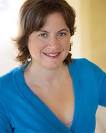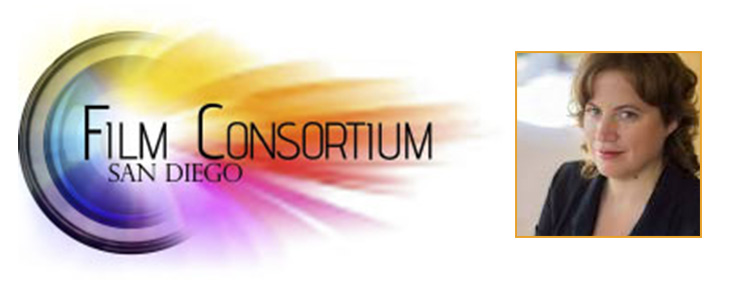 Jodi Cilley is a long-time filmmaker, entrepreneur and educator. She teaches video production at U.C. San Diego Extension’s Digital Arts Center Video and Editing Program, and at Platt College and the Media Arts Center San Diego. She has led students in the production of over 30 short documentaries, 15 short films, and a variety of PSAs, commercials, live event videos and music videos.
Jodi Cilley is a long-time filmmaker, entrepreneur and educator. She teaches video production at U.C. San Diego Extension’s Digital Arts Center Video and Editing Program, and at Platt College and the Media Arts Center San Diego. She has led students in the production of over 30 short documentaries, 15 short films, and a variety of PSAs, commercials, live event videos and music videos.
As a founder and current president of the Film Consortium San Diego, she is working to build a strong local film industry and to increase exhibition, distribution, and funding and employment opportunities for local up-and-coming film talent.
Originally from Barrington, Vermont, Jodi had a rural, small town upbringing. Going to Boston College gave her first feel of a big city.
“I knew I didn’t want to go back to a small town, and one of my college friends had the idea to move to California. Boston was having such horrible winter weather at the time that we agreed. Three of us moved out here in the ‘90s and two of us are still here, fifteen years later.”
Even though she didn’t study film in college that was the time she was first exposed to non-mainstream film and independent film.
A couple of years in San Diego, Jodi got a job at a homeless shelter, where she worked with at-risk teenagers. She was asked to travel to Japan with a group from her organization to give a presentation on their social services programs. She was told that she could either do a PowerPoint presentation, or make a film.
“In my head, making a movie was way easier than public speaking. But it turned out to be so not the case. I had to learn how to film, how to edit. But to me, it was easier than the thought of doing a huge public speaking event. As it turns out, I had to do a spoken presentation anyway.”
Jodi ended up making a documentary film about the homeless shelter for teenagers, and how diversity among her coworkers helped them learn how to work with their diverse clientele.
“Most of the way I learned about film was by making film. I took some one-off classes here and there to fill in the holes in my knowledge, rather than to gain a whole new career skill set.”
“I would start a new class as a student with an agenda. I would tell the instructor ‘these are the five things about editing that bug me’ and I would use the class to figure out how to do them.”
From 2007 to 2010, Jodi got an M.B.A. “I sort of fell in love with the venture capital aspect of business. I know it’s not literally the same, but I felt like venture capital was sort of the social work of the business world. People put money into talent, and I really took to that.”
After business school, Jodi decided she wanted to go full-time into video production. She started making commercials, videos for nonprofit organizations, and she got an internship at a micro-finance firm to learn about the business side of it.
And Jodi wanted to get back to working with young people.
“Now that I had a Master’s Degree, I could start working with young people at the college level.”
And this is when all of her experiences started to converge.
“It was around that time that I put all my experiences together into one moment.” – The social work, the venture capital, the filmmaking, the multicultural experiences – “and I thought that maybe there’s something bigger we can be doing here in San Diego.”
And that’s how the Film Consortium of San Diego was born.
And being a teacher came easily to Jodi.
“I just sort of fell into it naturally. I’d worked with homeless kids for years, and with that came a lot of teaching. And when I started teaching, it was to at-risk kids.”
She was teaching life skills and cultural history to the different groups of teenagers who came to the shelter.
“After years of this, I became pretty good at teaching. It was fun, it was exciting, and it was always changing. I’m not good at repetition, and teaching these kids was always different.”
And teaching filmmaking to her students has made her a better filmmaker herself.
“I’m not up there lecturing. We’re not sitting around. We’re out there making films. The only way you get better at making films in my opinion is by making films. I can tell you how to do things all day long, but until you physically do them, and screw them up and have to fix them, it’s really hard to learn.”
And the art of making a film goes way beyond the camera.
“There are so many skill sets required such as technical skills, creative skills, interpersonal, management of people and time, organizational skills. To learn all of that, you have to go hands-on and do it.”
And teaching also keeps her connected to the new and up-and-coming talent in San Diego.
“So many kids I’ve taught over the years are now in some way involved in the Consortium. They come out in droves because they want to help on projects and be a part of making a film. I get to scout new talent, and connect them to professional filmmakers. It creates a nice, active ecosystem of professionals getting help on projects, and they in turn get to help train the new talent on the job.”
Jodi’s history doesn’t necessarily point to a film career. She was busy living her life, and her passion found her.
“My father’s family has a maple syrup farm in Vermont. It was a very outdoorsy childhood. And the movies we watched were all very traditional, action movies and so on. It was when I got to college and I started seeing the more obscure, independent films, like Pi and Brazil that I became fascinated. I loved the films that broke the rules. They really blew my mind.”
And she found people around her with this common interest.
“If there’s one thing I’m good at, its community building. Its bringing people together and making things happen. It’s my natural instinct to get a lot of people around me with a common interest, and get them focused on something. It’s usually in the art space. Two things I love are writing and photography, and filmmaking is the combination of those two. Realizing this is what helped me decide that film is what I wanted to do. And the other thing for me is community. Film is a collaborative art form. You need a lot of people to pull off a film successfully.”
Filmmaking turned out to be the combination of all the things Jodi loved.
And what started Jodi down this road was that she felt she may have an interest, so she took a class at a small community college near her home.
“The teacher’s assistant was super inspirational. A group of five or six of us made a film, and because I’d had some experience, the others thought I should direct it. We ended up making a zombie movie called Point Of Infection, which we look back and laugh at now because it really was the point that started us all in this direction.”
Jodi’s new career grew out of that one community college class.
“The teacher was really supportive, and helped us stay focused and moving forward. And that group of us was what would become the Consortium.”
But the idea for the Consortium came later.
“I started teaching at Platt College. It’s a privately owned, local little college, kind of a design school. And a lot of students there study motion graphics, special effects, and video.”
Jodi loved the environment, but she saw a problem.
“What I often saw was a lot of kids graduating with a lot of debt and not a lot of opportunity to find work in San Diego. At this point, I was already building a small film community around me. One kid in particular was really talented. He couldn’t find a job; he was working at a drug store. And I was thinking, ‘how does this make sense? How is this guy with an insane amount of talent unable to find work in his field?’ So I started doing research. We’re two hours from L.A., but I kept getting shut down trying to figure out how to build a film community here. There are a lot of cities a lot farther away from L.A. that has a lot more going on in film than we do. This kid would have to move to get a job making films.”
It started to make sense to Jodi when she looked at it from a business point of view.
“I looked at what was missing. And what was missing was there was no centralized communication, no centralized access. At the same time, the cost of making a film was really starting to drop. Cameras were getting smaller and cheaper. There was new access to distribution, new access to funding, equipment was getting cheaper and better, and a whole new opportunity to make independent film was starting up that had never existed before.”
And to Jodi, it was like the perfect storm.
“You combine these new market conditions, plus no infrastructure, plus a lot of people here who are interested in this sort of thing, and I saw the opportunity to do something.”
And so, as she loves to do, she brought people together.
“We had one event, and 350 people participated, and it made me think that there was some real potential here. The argument that so many people make is that investors want talent from L.A. to come to San Diego. The proven success is where they want to put their money. But I wanted to bring talent from here, and to bring money to that work. And it took years before people even realized that this was a viable idea.”
Some people even said that this had been tried before, and it had failed.
“Yeah,” says Jodi, “but those people weren’t me, and that technology wasn’t this. They tried it when it cost $50,000 to get into filmmaking. Now you can get started for $1,000. And you’ve got social media and the internet that makes so many people so much more accessible.”
After about a year and a half of growing the community, hosting events, finding funding, and getting some films made, last year, they held the first San Diego Film Awards. It highlighted the best of the local filmmakers, and received a lot of local attention.
“Since then, those film makers have been busier than ever,” Jodi says. “San Diego is now producing as much as a film a day. This is double the amount from last year. Now we have a film festival, so not only the filmmakers, but lots of other people can come out and watch the films.”
“The natural progression is increasing the quality and quantity of the work. Everyone is mentoring each other, volunteering to help each other. And you’ve got the schools supporting and sponsoring events. It’s growing to the point where the quality of films is going to rival the kinds of films people are used to watching.”
And of where she sees her place in all this in the future, Jodi says this:
“I’m just making the world I want to live in. I want to live in a world where I’m surrounded by creative people, where there’s a support system in place that keeps it growing and thriving. I would like to build a legacy that is very counter-intuitive to what people are used to when they think about the film industry rather than being competitive and harsh, like the film industry is famous for being. This drives people away.”
And when fewer people pursue their dream of filmmaking, fewer great films get made.
“I want to see us making films, making money, generating business, but staying together as a community.”
And in general, to anyone who is feeling like they may be on the verge of some sort of shift in their lives, into any sort of endeavor, looking for inspiration, for a community, for support to go for it, Jodi says this:
“Move toward whatever you are instinctually drawn to. I think that on some basic, instinctual level, most people know what they should be doing. And you have to have the courage to follow the impulse to do it. You may have a job that pays the bills, but makes you unhappy. But if you start down a road of doing what you love, of taking one step at a time toward your passion, then things will work out the way they are supposed to.”
“Just take it one step at a time,” Jodi says, “and sees where it leads you.”
Keep your job that pays the bills, but take a class, find a club of some kind. And if you can’t find a club, if you’re anything like Jodi, you’ll start one.
“Over time, things will fall into place. We create a lot of unhappiness and strife in our lives when we’re not doing the things we love to do, and that’s why things may not be working out. So, try to follow your instincts, follow your passion, even while being practical and keeping the boring job to pay the bills. But if you work toward the goal of getting to a place where you’re doing something that makes you happy, then you start building the pieces that can eventually all fall into place.
She continues, “Now I know why I studied sociology. I know why I went to business school. I know why film has always been important to me. I know why I was always drawn to teaching.”
And it’s also important to keep this in mind, Jodi says. “Every time you make a decision to move toward something that is important to you, there are always going to be critics. You just have to silence the critics. No one knows exactly what you’re trying to accomplish and why, except you. But then you get those outside voices that complain, or fear for you, or tell you how they would do things differently. And that’s great for them. They would do things differently because they are different people.”
Finally, Jodi says, “spend time doing what you love. One thing leads to the next. Momentum builds in the direction of your passion, and one day, maybe years from now, you find yourself in the place you feel you’re supposed to be.”
Pretty good advice!
San Diego Film Consortium 2014 Reel
_____________________________
 Jodi Cilley has a BS in Sociology from Boston College and an MBA with specializations in entrepreneurship and management from San Diego State University. She is the lead instructor of video production for the U.C. San Diego Extension’s Digital Arts Center Video and Editing Program. She also teaches introductory and advanced classes at Platt College and the Media Arts Center San Diego. And she is a founder and the current president of the Film Consortium San Diego. She has produced over a hundred of her own projects, including short films, documentaries and commercial projects.
Jodi Cilley has a BS in Sociology from Boston College and an MBA with specializations in entrepreneurship and management from San Diego State University. She is the lead instructor of video production for the U.C. San Diego Extension’s Digital Arts Center Video and Editing Program. She also teaches introductory and advanced classes at Platt College and the Media Arts Center San Diego. And she is a founder and the current president of the Film Consortium San Diego. She has produced over a hundred of her own projects, including short films, documentaries and commercial projects.

